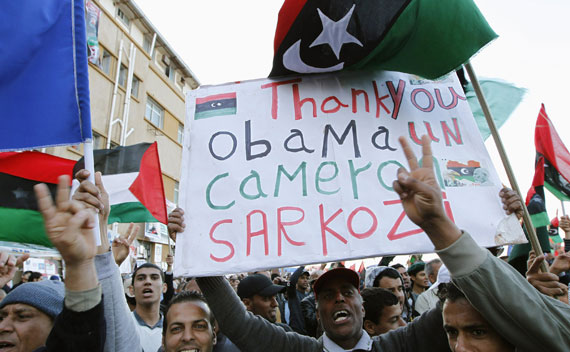Guest Post: Making Qaddafi Go
More on:

President Obama has demanded that Libyan strongman Muammar Qaddafi relinquish power. Despite signs over the weekend that the Colonel’s regime may be splintering, he remains in charge. So I asked Jim Goldgeier, a professor at George Washington University and the co-author of the invaluable America Between the Wars: From 11/9 to 9/11, to look for lessons in Washington’s recent efforts at making other dictators go. What he finds is that dictators generally don’t take the hint that they should leave. They need a strong shove.
One month ago, President Obama said at a White House press conference:
You have seen with great clarity that [Qaddafi] has lost legitimacy with his people. So let me just be very unambiguous about this. Colonel Qaddafi needs to step down from power and leave. That is good for his country. It is good for his people. It’s the right thing to do.
Perhaps the president was buoyed by the eventual response of Egyptian president Hosni Mubarak to a similar suggestion. But if there is one thing we have learned in the past two decades, it is that when the United States tells foreign leaders to go, they most often reply: Make me.
In his first year in office, George H. W. Bush turned his sights on Panamanian leader Manuel Noriega. In May 1989, the president argued, “I would like to think that [Noriega] will heed the call of the people and that he would listen to the international outcry that is building and that he would step down from office--in which case relations with the United States would improve dramatically and instantly.” When he was asked if he had given Noriega a direct ultimatum, Bush replied, “Put it this way: Gen. Noriega knows my position.” And asked further if Noriega faced a deadline, the president responded, “I don’t believe in deadlines.”
The United States never did present Noriega with a clear ultimatum; in December 1989, U.S. troops simply invaded Panama and removed Noriega to the United States.
Three years later, it was the Clinton administration’s turn. In his first week in office, with Saddam Hussein violating UN authorized no-fly-zones (sound familiar?), Secretary of Defense Les Aspin declared, “I think that in order to get those UN resolutions, Saddam Hussein has to go.” As we know, American and British forces patrolled those no-fly-zones for another decade before George W. Bush decided he had had enough and deposed the Iraqi leader by force.
In the summer of 1994, the Clinton team decided Haitian leader Raoul Cédras had to go. As is the case today, the United States tried economic pressure to get Cédras to step down. Asked about the possibility of a U.S. invasion to restore democratically elected leader Jean Bertrand Aristide to power, Defense Secretary William Perry argued:
I think the pressure on the Haitian military leaders is increasing very substantially as a result of the increased sanctions that we’ve taken. I think we should continue to believe that we should give some time to see that process work itself out, and I think we may see some very substantial results from that. The conventional wisdom is that sanctions cannot be effective, that they cannot force governments to change their actions. This may be a counter-example.
But what finally caused Cédras to leave? In September, President Clinton sent former president Jimmy Carter, retired general Colin Powell and Senator Sam Nunn to make clear to the Haitian leader that it really was time. The American delegation told Cédras that planes were in the air, and he should take their offer of exile. Only with the invasion force on the way did Cédras finally concede.
Today, hope abounds that the pressure is getting to Qaddafi. High-level defections continue, and the financial vise is increasing. And perhaps New York Times columnist Thomas Friedman’s prayer will be answered that Obama will get lucky and the regime will collapse. But it may take more than luck. Like Saddam, Qaddafi may believe that the United States won’t really come after him (particularly since we have said we won’t). Like Noriega, he won’t understand that the wish is actually a demand. And like Cédras, he may need a clear offer that gives him an incentive to leave. (It is unlikely he will see a trip to The Hague as sufficiently attractive.)
It may, in fact, take a combination of a direct visit plus a serious commitment to depose him to get him to leave office. It can’t, of course, be an American delegation as it was in Haiti. Perhaps a European statesman along with someone from the Arab world and (as in 1999 when Milosevic decided to end the fighting over Kosovo) a representative from a country like Russia could make a difference. But our recent history does suggest that simply saying he needs to leave (and praying for it) won’t be enough. Obama is right to be wary of committing U.S. troops to a war in Libya. But he should recognize that simply declaring that a leader must go has in the past not been enough to dislodge autocrats like Qaddafi. If Obama and his coalition partners really want Qaddafi gone, they will have to decide how far they are willing to go to make it happen.
More on:
 Online Store
Online Store